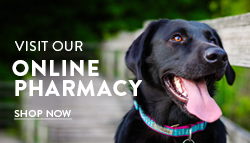Blog
Dogs and cats are so different in so many ways and on so many levels, but one thing they have in common is that they are often attracted to the scent and taste of Antifreeze (Ethylene Glycol), which if ingested is extremely poisonous!!! You may be saying, “there is no way my pet would get into antifreeze because I’m careful about where this type of stuff is kept in my house.” However, keep in mind that your pet can ingest this substance regardless of how careful you are. What about when you stop to talk to your friend on a walk and there’s a nice refreshing puddle full of antifreeze sitting right in front of your dog and you’re too busy talking to notice him/her lapping it up? Your pets may have access to the garage where you park your car and due to a recent leak, there is antifreeze on the floor, which they are more than happy to take a taste of. Antifreeze poisoning occurs much easier and a lot more frequently than you would ever imagine.
Since 1927, when Prestone popularized non-alcohol automotive radiator coolants, antifreeze is the most common cause of accidental poisoning of cats and dogs. Its inviting aroma and sweet taste, not only appeal to our not so finicky dogs but surprisingly, even cats are quick to try it. Thankfully, in 2012 manufacturers agreed to add a bittering agent to the formula so that it is not as appealing to our pets. Nonetheless, its exceedingly important to be aware of this lethal agent and to do what you can to keep it away from your pets. The lethal dose of antifreeze for a cat is only half a tablespoon, which leaves us very little wiggle room once they have a lick!
Here are some signs to look for should you ever be concerned with possible antifreeze ingestion:
- Drunkenness
- Excessive thirst
- Lethargy
- Unusual panting
- Disorientation
- Lack of coordination
It is of the utmost importance to take your pet to a veterinarian the minute you suspect ingestion due to the fact that getting your pet medical attention in the first few hours is critical! Symptoms can occur as quickly as thirty minutes after ingestion and will often worsen within a few hours. Pets who receive immediate medical care can recover successfully; making it so important to recognize the above-listed symptoms in relation to antifreeze poisoning.
These are the things that Dr. Shiffman says you can do in order to prevent your pet from ingesting Ethylene Glycol, the poisonous ingredient in Antifreeze;
- Switch to a brand of antifreeze that uses Propylene Glycol instead of Ethylene Glycol, as it has been recognized as a safe substance.
- Never allow your pet in your garage unattended.
- Always supervise your pets while outside and in areas where antifreeze can be on the ground.
- Keep all poisonous substances sealed and stored away where your pet is unable to reach it.
We hope with this helpful information and useful tips that you and your pets stay safe!! Should you have any questions do not hesitate to contact your veterinarian!!!!






